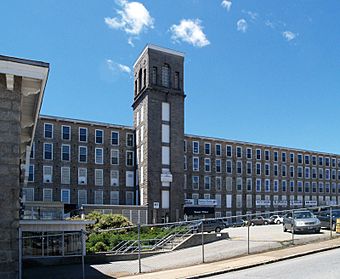Barnard Mills facts for kids
Quick facts for kids |
|
|
Barnard Mills
|
|
 |
|
| Location | 641–657 Quarry St., Fall River, Massachusetts |
|---|---|
| Built | 1874 |
| Architect | Walter C. Huston |
| MPS | Fall River MRA |
| NRHP reference No. | 83000623 |
| Added to NRHP | February 16, 1983 |
The Barnard Mills is a really old building in Fall River, Massachusetts. It's located at 641-657 Quarry Street. This historic mill started being built in 1874. It was super important because it was the first mill to use a new type of machine called "ring spinners." This was a big deal for making cloth!
Barnard Mills was a huge employer in the area. Many people worked there. It kept making cloth until it closed in 1939. Today, the old mill has been given a new life. It's now a place with shops and businesses called Tower Mill. Because of its history, Barnard Mills was added to the National Register of Historic Places in 1983. This means it's a special building worth protecting.
Contents
What is Barnard Mills?
The Barnard Mills building is easy to spot. It sits between Quarry Street and the Quequechan River. You can see it near the highway, Interstate 195.
A Look Inside the Mill
The main part of the mill is a tall, five-story building. It's made from strong granite stone. This building is about 280 feet (85 meters) long and 74 feet (23 meters) wide. In the middle, there's a tall tower that looks like it belongs in Italy. Attached to the main building is a two-story granite shed. This part was used for weaving cloth.
How the Mill Changed History
The company that owned the mill started in 1872. But the actual building wasn't finished until 1874. It was built using granite from Fall River. This was a busy time for building textile mills in the city. Many mills were being built after the American Civil War.
When it first opened, the mill had 28,000 spindles. These are parts of machines that twist fibers into yarn. Later, in 1896, the weave shed was added. This made the mill much bigger, with 66,000 spindles!
Barnard Mills was very special. It was the first mill in Fall River to print cloth that was wider than 28 inches (71 cm). This meant they could make bigger pieces of fabric. Over time, the mill started making different types of cloth. They made tweeds and twills, which are kinds of woven fabrics. The company eventually closed down in 1939.
From Factory to Shops
After many years, the old mill found a new purpose. In the 1980s, it was changed into a shopping center. It was first called Tower Place. Now, it's known as Tower Mill. Today, you can find many different shops and businesses inside this historic building.



